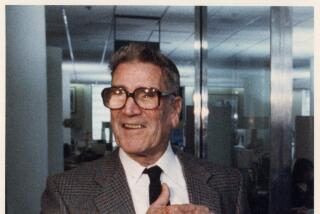Mike Marjama reached the majors, then quit baseball for a very unusual — and personal — reason

- Share via
The line is buried among dozens of Major League Baseball transactions on July 6: “C Mike Marjama retired.”
The Long Beach State graduate endured the peanut butter and jelly sandwiches, meager paychecks and long bus rides during seven seasons in the minor leagues to finally start for the Seattle Mariners on opening day this spring.
Then he quit to become an unpaid volunteer for an organization combating eating disorders.
“For most of my life I believed that my purpose was to play Major League Baseball,” Marjama wrote a few days later in a letter explaining the decision. “Having achieved more than I could have ever imagined in the game, I began to realize that my mission in life means more than a baseball career, success or earnings.”
He ended with an emphatic statement: “I AM MORE THAN AN ATHLETE!”
When baseball’s regular season ends Sunday, the 29-year-old will be in Washington as an ambassador for the National Eating Disorders Assn. He’ll tell members of Congress about the eating disorder that almost took his life during high school in Granite Bay, Calif., and helped trigger the career change.
“It was shocking,” said Andy McKay, the director of player development for the Mariners who coached Marjama at Sacramento City College. “He would’ve been back in the big leagues. But I understand it, too. He thinks he has a chance to have a bigger impact on the world through this. I can’t debate that.”
Back in high school, Marjama wanted to look like one of those shirtless, musclebound models in Abercrombie & Fitch advertisements. He ate less and worked out more. It didn’t help. When he turned out for wrestling, he used tricks like wrapping himself in trash bags and riding a stationary bike under a hot shower to cut weight. He became bulimic. His weight dropped to 130 pounds.
The behavior led to hospitalization and inpatient treatment after his heart rate plummeted to dangerous levels during his junior year.
“I started to learn it’s OK to have problems. That’s one of the hardest things,” Marjama said. “It’s OK to have issues. It’s OK to have problems. But it’s how we address them that’s the key. We’re in this microwave society and we know that things can’t happen overnight.”
He wasn’t recruited out of high school and didn’t make Sacramento City College’s team as a freshman. His focused, aggressive, borderline obsessive personality impressed McKay. Would it lead to a career in professional baseball? The coach didn’t think he had a chance.
But Marjama worked his way from an unremarkable high school player to Long Beach State to being picked in the 23rd round of the 2011 draft by the Chicago White Sox. He learned to use food as fuel. He reminded himself that if he could survive an eating disorder, he could handle the obstacles from 523 minor league games — plus working as a substitute teacher to make ends meeting during the offseason.
Two years ago, Marjama suffered a pulmonary embolism. He has to take blood thinners for the rest of his life. He didn’t tell teams about the medication because he wanted to keep playing. Then he realized he could live without baseball.
Majama collaborated with Uninterrupted, the media platform started by LeBron James, on a short documentary over the winter about his eating disorder. Teammates, even strangers on social media, approached Marjama to share their struggles with eating disorders. The stigma and awkwardness he once felt about being a man who had an eating disorder faded.
Marjama connected with Kristen Snow, NEDA’s senior director of strategic partnerships, about the possibility of working with the group.
“This is not a story you’ve often heard,” she said. “I thought it was really brave of him to come forward. There are so many misconceptions about who is impacted by eating disorders.”
After taking a foul tip to the catcher’s mask during a game in late June with the triple-A Tacoma Rainiers, Marjama landed on the disabled list because of a concussion. On a rehabilitation assignment a couple of weeks later, he realized how much he enjoyed working with younger players excited to be around someone with 38 big league plate appearances.
Then Marjama’s back went out.
When McKay called in early July to offer encouragement — and remind Marjama he could return to the Mariners soon because of the team’s lack of depth at catcher — the player pulled his car over to the side of the road.
“I’m done,” Marjama said.
McKay made a halfhearted attempt to talk him out of retirement. It didn’t work.
“I knew Mike,” McKay said. “I knew there wasn’t going to be any turning back.”
Marjama wasn’t being pushed out of the game because he wasn’t good enough. He had another career to step into. That made the decision easy, not a reaction to the latest injury.
“There’s so many things I want to accomplish and not all of them revolve around baseball,” he said. “I got to the pinnacle in one place in my career and I want to do that in other areas, as well.”
These days Marjama ping-pongs around the country for speaking engagements, media interviews and fundraisers. He donates his old bats and catching gear to raise money for charity. He’s helping with a NEDA pilot program to address body confidence and media literacy with boys. He’s working on a book. He’s not slowing down.
“I admire his decision,” Mariners general manager Jerry Dipoto said. “He conquered a complex issue in his young life and remained connected to the cause, encouraging others throughout. This new opportunity is right up his alley and he’ll be a great voice.”
Times staff writer Mike DiGiovanna contributed to this report.
Twitter: @nathanfenno
More to Read
Go beyond the scoreboard
Get the latest on L.A.'s teams in the daily Sports Report newsletter.
You may occasionally receive promotional content from the Los Angeles Times.











